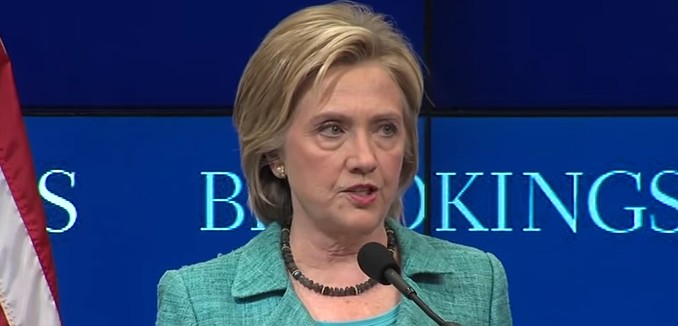Private documents released by WikiLeaks show that Democratic presidential nominee Hillary Clinton held significantly different private views on Middle East policy than President Barack Obama, Eli Lake of Bloomberg View reported Monday.
In the transcript of a speech given to the Jewish United Fund of Metropolitan Chicago in 2013, Clinton rejected the idea that Iranian President Hassan Rouhani was in any way an agent of moderate change in Iran. “I believe that Rouhani was allowed to be elected by the two major power sources in Iran, the supreme leader and the clerics and the Revolutionary Guard … in part because the sanctions were having a quite damaging effect on the economy,” her transcript read.
“I don’t think anyone should have any illusions as to the motives of the Iranian leadership,” she added. “What they really want to do is get sanction relief and give as little as possible for that sanction relief.” She also dismissed Rouhani’s moderation as a “charm offensive” intended to deceive the West, not to bring about change in Iran.
This contrasted with the view that Obama expressed to NPR in April 2015, when he portrayed Rouhani as a change agent: “I think that, if in fact the Rouhani administration — the forces that are more moderating, even if, let’s acknowledge, that they don’t share our values and they still consider us an enemy — if they are shown to have delivered for their people, presumably it strengthens their hand vis-a-vis some of the hardliners inside of Iran.”
Leaked e-mails show Clinton to be more attentive to concerns of skeptics of the nuclear deal with Iran. In a December 2015 e-mail exchange between Stuart Eizenstat, a senior State Department official under Bill Clinton, and Jake Sullivan, Hillary Clinton’s chief national security adviser, Eizenstat quoted a senior Israeli official who wrote that Israeli Prime Minister Benjamin Netanyahu “always had a ‘surprising good relationship’ with Hillary; she is ‘easy to work with,’ and that she is more instinctively sympathetic to Israel than the White House.”
In another speech, Clinton criticized the president for his failure to enforce the “red line” he declared when the government of Syrian president Bashar al-Assad used chemical weapons against civilians in September 2013, killing more than 1,400 people. “You can’t squander your reputation and your leadership capital,” Clinton said at a Goldman Sachs event in October 2013. “You have to do what you say you’re going to do. You have to be smart about executing on your strategies. And you’ve got to be careful not to send the wrong message to others, such as Iran.”
The WikiLeaks transcripts comport with other indications Clinton has given about what shape U.S. foreign policy might take under her administration. In a speech at the Brookings Institution in September 2015, Clinton outlined five steps she would take to counter Iran’s growing influence in the Middle East: an “unshakeable commitment to Israel’s military security;” defending the Persian Gulf and assuring Gulf allies that America will act if they are threatened; building coalitions across the Middle East to battle Iran’s proxies and to enforce embargoes of Iranian arms shipments; taking a strong stand against Iran’s humans rights abuses; and adopting a “comprehensive regional strategy that promotes stability and counters extremism.”
In the same speech, Clinton said that “not being able to follow through on [the “red line” violation] cost us.” She also pledged to keep disagreements with the Israeli government private, and to invite the Israeli prime minister to Washington during her first month in office, which she reiterated in an op-ed in The Forward.
[Photo: Brookings Institution / YouTube ]




